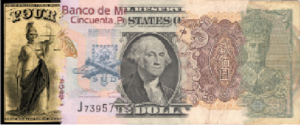Rising tuition and limited resources create hurdles for international Racers

Study by Lindsey Coleman, Staff writer
According to the National Center for Education Statistics, in the 2014 school year, the average cost of undergraduate tuition, fees, room and board in America was estimated at $16,188 for public institutions.
Top Ten Online Colleges estimates that tuition rates and fees are generally cheaper around the world than in America. The average semester cost is $11,865 in Japan, $5,077 in Mexico and $5,288 in Great Britain.
For full-time Murray State students, tuition runs anywhere from $4,200 to $11,340, depending on the student’s residency status. International students at Murray State pay the out of state tuition rate: $11,340 per semester.
Don Robertson, vice president for Student Affairs, and Bill McKibben, director for International Enrollment and Retention, explained the lengths the university goes to in order to make the more than 500 international students’ experiences on campus affordable.
“We work very hard, as we do with all students, to keep it as affordable as we can because we know the value of having internationals on this campus,” Robertson said. “It makes us more of a global campus. It’s important for our American students to have that exposure.”
He said Murray State recognizes a substantial cost is involved when coming to America. For visa purposes, international students must show a financial guarantee that they can pay for one year tuition before coming to America.
Robertson said the university tries to hire international students on campus to help offset costs. These jobs are typically at Winslow Dining Hall, the Curris Center and the Wellness Center.
McKibben said they try to make sure international students are well aware of the costs before they arrive.
Although international students don’t qualify for federal financial aid, they do qualify for some scholarships through the university.
The Global Outreach Scholarship is one opportunity for international students: full-time undergraduate students receive a $2,500 waiver applied to their tuition cost each semester, and graduate students receive a $3,000 waiver per semester.
“That’s very helpful for the international students, but that price hasn’t increased,” McKibben said. “As tuition has increased, it really hasn’t had much of an impact.”
Another scholarship opportunity, the International Leadership Scholarship, is only awarded to five students per year, selected based on their grades, community service and leadership qualities. The scholarship awards in-state tuition rates for the recipients.
To study in the U.S., international students must obtain a student visa, which according to the U.S. Department of State Bureau of Consular Affairs, costs $160 to apply for, and depending on the country, there may be other fees involved.
Howard Li, exchange student from Taiwan, said this semester he is taking ESL along with his other university classes, which has significantly increased the cost of his tuition. His trip to America alone cost roughly $1,500 round-trip.
In Taiwan, he said a semester would have cost around $1,500 USD. Now, he’s paying $11,340 USD for tuition this semester at Murray State.
In addition, extra residential costs and meal plan expenses are added. Li lives in the newly renovated Richmond Residential College on campus.
“I think it’s too much,” Li said. “I can understand that the tuition is expensive, but the residence cost is hilarious.”
Despite financial expenses, Li said his time at Murray State has been worth it to him.
“If I stayed home, there would have been a lot of things I couldn’t have experienced,” Li said.
Abraham Akabekwa, freshman from Nigeria, said he plans to earn a bachelor’s degree at Murray State and eventually go back to Nigeria to work in a hospital, but paying around $13,000 per semester for housing, his meal plan and fees is taking a toll on him.
“It’s a really hard situation,” Akabekwa said. “To me the economy is dead in Nigeria.”
He said the exchange rate in Nigeria makes paying for college even harder – $1 in the U.S. is equal to 317 naira in Nigeria.
“I’m kind of disappointed, because I have this American dream,” he said.
But that dream is fading for him as he feels the weight of paying for college, Akabekwa said.



























































































